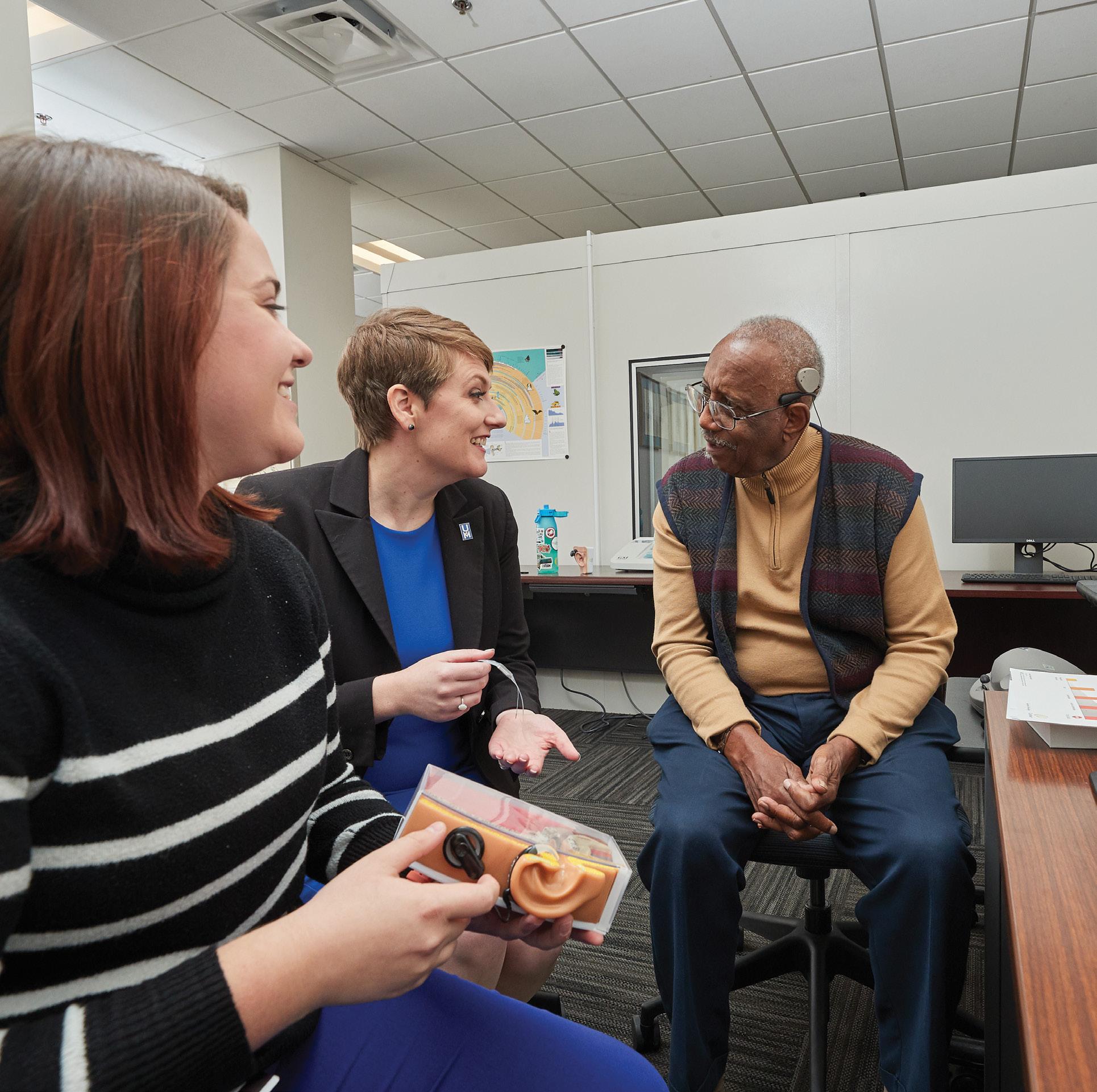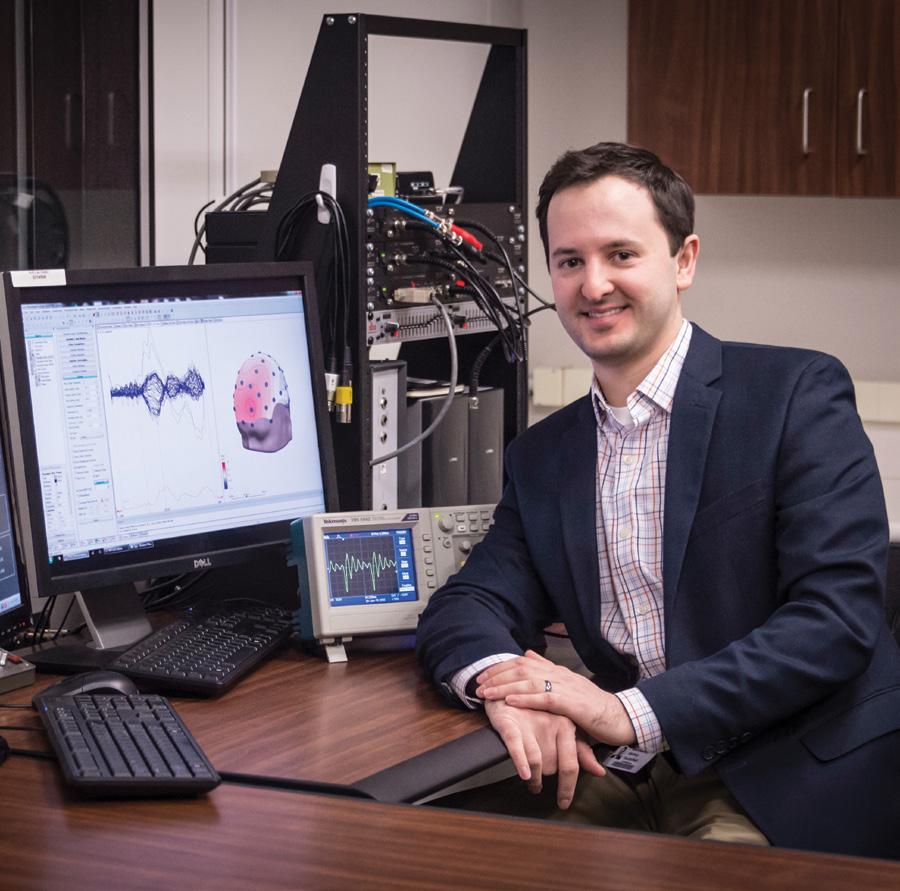
3 minute read
Hearing Aid Research Laboratory
Hearing Aid Research Laboratory harlmemphis.org
Jani Johnson AuD, PhD is assistant professor in the School of Communication Sciences and Disorders and has served on the faculty since 2016. She received her BS in Communicative Disorders at Auburn University in 2003. She then pursued her AuD (2007) and PhD (2011) from the University of Memphis, where she now teaches Introduction to Hearing Aids, Adult Audiologic Rehabilitation and Aging, Psychosocial Adjustment to Hearing Loss and Evidence Based Practices in the Provision of Amplification. Dr. Johnson is currently the director of the Hearing Aid Research Laboratory (HARL). The HARL has a long history of producing highquality evidence designed to improve diagnostic and rehabilitative procedures for individuals with hearing impairment.
Research Interests Dr. Johnson’s research interests include multicultural issues in audiology and adult audiologic rehabilitation with a focus on hearing aids. Her research aims to provide evidence to inform hearing aid fitting and hearing healthcare delivery practices that are optimized for older adults of varying cultural background and social circumstance. She has taken steps toward this purpose by examining the effectiveness and real-world value of current hearing aid fitting practices for older adults and attempting to explain sociocultural causes of local racial/ethnic disparities in the receipt of hearing health care.
Current Research and Applications The HARL has a state-of-the-art laboratory that facilitates the conduct of cutting edge research on the effectiveness of hearing health care practices for older adults. Dr. Johnson and her colleagues often collaborate with hearing health care practitioners both locally and across the United States. Recent papers have investigated the real-world value of high-cost hearing aid technologies for older adults in several domains of daily listening. Through her research, Dr. Johnson strives to provide practical evidence that clinicians can use when making recommendations for individual patients in their practices and to help influence policy that will increase access to affordable, high-quality hearing health care for adults with hearing impairment.
In the past year, several research papers have been published on data from the HARL. A recent lab article was nominated for the Editors Award for Best Article in Ear and Hearing in 2016. The results of research from the HARL have been presented to representatives of the National Academies of Sciences, Engineering, and Medicine, and to the Federal Trade Commission. These results have been important for influencing policy surrounding issues of accessibility and affordability of hearing health care.
Future Endeavors Dr. Johnson’s future research will provide independent effectiveness evidence for emerging hearing assistive technologies and hearing rehabilitation practices. She is also interested in the impact that hearing health care disparities might have on hearing health-related quality of life across the lifespan and how access to alternative hearing technologies and alternate models of hearing healthcare delivery might affect hearing outcomes for culturally and socio-economically diverse individuals.
Student Involvement Research in the HARL concerns a variety of issues related to adult audiologic rehabilitation and hearing aids. Graduate students wishing to work in the HARL should be self-motivated and enthusiastic about translational research in this area.

Dr. Johnson has high expectations of AuD students completing research projects. At the conclusion of this hands-on research process, students are expected to understand fundamentals of research design, know how to implement specific research methods and manage data, participate in the interpretation of results, and gain confidence in presenting research findings. Students take a central role at each stage of the research process. Those interested in completing a PhD with Dr. Johnson as their primary

mentor should have a record of academic excellence and an interest in pursuing a research career in the areas of adult audiologic rehabilitation and hearing aids.
Publication Spotlight 1. Johnson, J., Xu, J. & Cox, R. (2017). Impact of hearing aid technology on outcomes in daily life, III: Localization in quiet and in noise. Ear & Hearing, 38(6), 746-759 2. Johnson, J. Xu, J., Cox, R. (2016). Impact of hearing aid technology on outcomes in daily life, II: Speech understanding and listening effort. Ear & Hearing, 37 (5), 529-540. 3. Cox, R., Johnson, J. & Xu, J. (2016). Impact of hearing aid technology on outcomes in daily life, I: The patient’s perspective.
Ear & Hearing, 37 (4), 224-237. 4. Johnson, J., Xu, J. Cox, R., & Pendergraft,
P. (2015). A comparison of two methods for measuring listening effort as part of an audiologic test battery. American Journal of Audiology, 24, 419-431. 5. Cox, R., Johnson, J., & Alexander, G. (2012).
Implications of high-frequency cochlear dead regions for hearing aid fittings: A laboratory and field trial for patients with mild to moderately-severe hearing loss. Ear & Hearing, 33 (5), 573-587.










